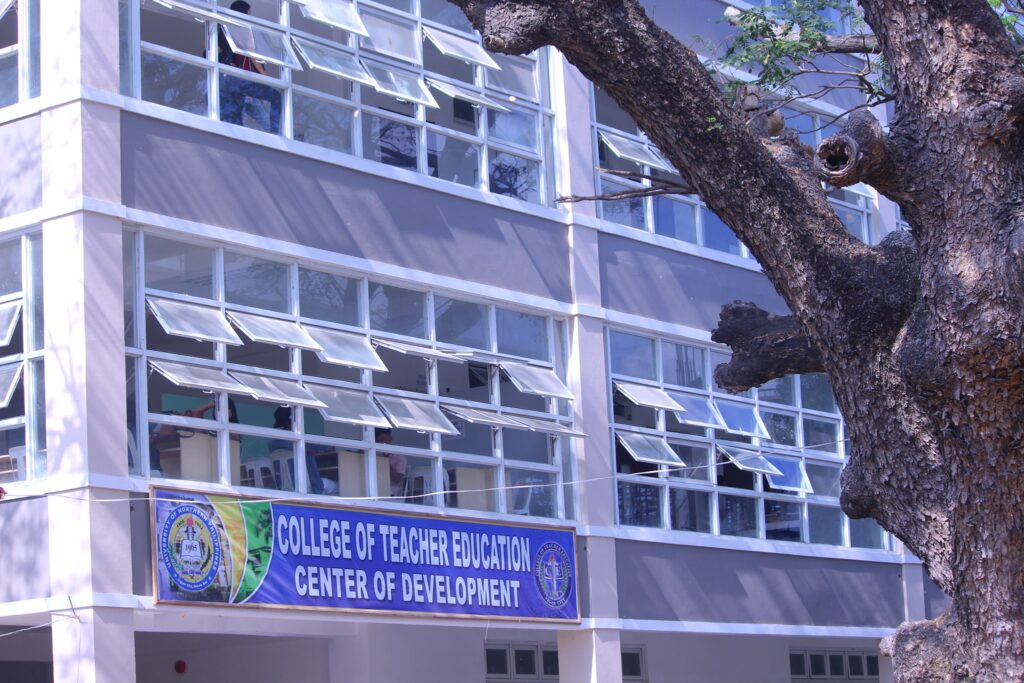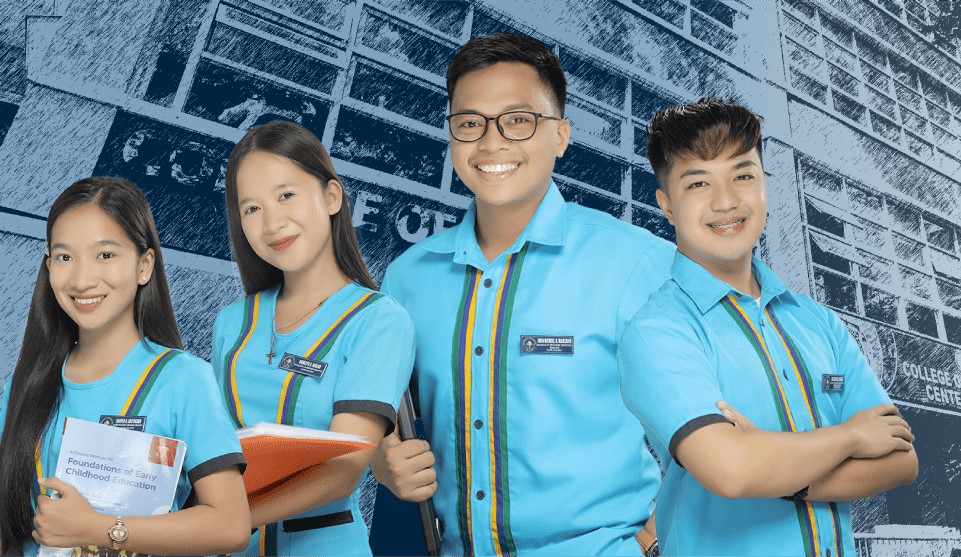About Us
The College traces its beginnings as early as in the establishment of the University by virtue of Republic Act 4449. At that time, UNP started with only two colleges, the College of Industrial Education (CIE) and the College of Engineering by virtue of Board of Regents Resolution No. 26, s. 1966. The CIE started a degree program of Bachelor of Science in Industrial Education (BSIE) on July 17, 1966 and had the first batch of BSIE graduates in 1968. Mr. Julian A. Corpuz as designated as the first head of the College.
In 1968, by virtue of Board Resolution No.120, S. 1968, the College of Teacher Education was established. Because of its expanding growth of enrollment and to accommodate students’ decisions to become teachers, the College of Teacher Education came offered three degree programs, namely: Bachelor of Science in Industrial Education (BSIE), Bachelor of Secondary Education (BSE), and Bachelor of Elementary Education (BEED).
In 1971, by virtue of Board Resolution No. 407, S. 1971, the Intermediate Grades (Grades V and VI) were opened to serve as laboratory for the student-teachers. The elementary curriculum expanded in 1980 to offer the complete elementary course. This was necessary as the enrolment in the different Teacher Education programs increased. Then in October 1980, President Romualdo B. Tadena designated Mrs. Maria S. Sumabat as the Dean of the College. When Dr. Dorotea Campos-Filart became the President in 1986, she designated Prof. Cirilo A. Parra as the Dean.
In 1998, a new President was appointed by the members of the Board of Regents in the person of Dr. Lauro B. Tacbas. Dr. Manuel Frando, the former College Secretary, became Acting Dean and Mr. Dante Bajet as Acting Secretary. In August 1999, Prof. Dionisio P. Tabuno was designated as Dean but unfortunately met his untimely demise on September 14, 1999. On October 1, 1999, Dr. Rosa R. de Peralta, formerly the BEED Program Head was designated as the Dean. Mr. Bajet continued to be the College Secretary.
When Dr. de Peralta resigned as the dean of the college on April, 2002, Dr. Ocarna B. Figuerres who was concurrently the Director for Instruction was appointed dean of the College. Ms. Necy Cesaria Vaquilar was designated as College Secretary on May 2002. During the stint of Dr. Figuerres, the College has been the provider of in-service training programs for the teachers of the Department of Education. She headed the College until 2011. Then in 2011, Dr. Agustina R. Tactay was named the dean, paving way to more improvements in the College through accreditation and application for the Center of Development status. Her deanship also saw the transferring of the graduate programs in education to the College from the Graduate School. In 2015, Dr. Christopher F. Bueno was named the Dean. It was also in the same year when the Center of Development status was conferred to the College. In 2019, the College was awarded the International Organization for Standardization (ISO) certification, proving that all its processes in dealing with its stakeholders are world-class.
Through the years, CTE has trained numerous teachers ready to serve the learning needs of the locality, many of whom have garnered key positions in the Department of Education and in local Higher Education Institutions. The College has also forged linkages with universities in Southeast Asia, paving way for exchange programs whereby students took their internship abroad such as in Vietnam and Thailand. Consequently, several alumni are now teachers in these countries. Whatever path of teaching alumni tread on, they carry the standard of education CTE has given them as they make a difference in the lives of their learners.
In 1968, by virtue of Board Resolution No.120, S. 1968, the College of Teacher Education was established. Because of its expanding growth of enrollment and to accommodate students’ decisions to become teachers, the College of Teacher Education came offered three degree programs, namely: Bachelor of Science in Industrial Education (BSIE), Bachelor of Secondary Education (BSE), and Bachelor of Elementary Education (BEED).
In 1971, by virtue of Board Resolution No. 407, S. 1971, the Intermediate Grades (Grades V and VI) were opened to serve as laboratory for the student-teachers. The elementary curriculum expanded in 1980 to offer the complete elementary course. This was necessary as the enrolment in the different Teacher Education programs increased. Then in October 1980, President Romualdo B. Tadena designated Mrs. Maria S. Sumabat as the Dean of the College. When Dr. Dorotea Campos-Filart became the President in 1986, she designated Prof. Cirilo A. Parra as the Dean.
In 1998, a new President was appointed by the members of the Board of Regents in the person of Dr. Lauro B. Tacbas. Dr. Manuel Frando, the former College Secretary, became Acting Dean and Mr. Dante Bajet as Acting Secretary. In August 1999, Prof. Dionisio P. Tabuno was designated as Dean but unfortunately met his untimely demise on September 14, 1999. On October 1, 1999, Dr. Rosa R. de Peralta, formerly the BEED Program Head was designated as the Dean. Mr. Bajet continued to be the College Secretary.
When Dr. de Peralta resigned as the dean of the college on April, 2002, Dr. Ocarna B. Figuerres who was concurrently the Director for Instruction was appointed dean of the College. Ms. Necy Cesaria Vaquilar was designated as College Secretary on May 2002. During the stint of Dr. Figuerres, the College has been the provider of in-service training programs for the teachers of the Department of Education. She headed the College until 2011. Then in 2011, Dr. Agustina R. Tactay was named the dean, paving way to more improvements in the College through accreditation and application for the Center of Development status. Her deanship also saw the transferring of the graduate programs in education to the College from the Graduate School. In 2015, Dr. Christopher F. Bueno was named the Dean. It was also in the same year when the Center of Development status was conferred to the College. In 2019, the College was awarded the International Organization for Standardization (ISO) certification, proving that all its processes in dealing with its stakeholders are world-class.
Through the years, CTE has trained numerous teachers ready to serve the learning needs of the locality, many of whom have garnered key positions in the Department of Education and in local Higher Education Institutions. The College has also forged linkages with universities in Southeast Asia, paving way for exchange programs whereby students took their internship abroad such as in Vietnam and Thailand. Consequently, several alumni are now teachers in these countries. Whatever path of teaching alumni tread on, they carry the standard of education CTE has given them as they make a difference in the lives of their learners.





Goal
To prepare globally competent teachers imbued with the ideals of Philippine education
Objectives
The College aims to produce teachers who are:
a. equipped with concepts, technical, pedagogical, and leadership skills;
b. capable of conducting relevant researches aimed at improving the teaching-learning process in coordination with local and foreign research agencies, and based on the UNP Research Agenda;
c. able to undertake research-based extension activities aimed at improving the quality of instruction at different levels; and
d. self-reliant.
a. equipped with concepts, technical, pedagogical, and leadership skills;
b. capable of conducting relevant researches aimed at improving the teaching-learning process in coordination with local and foreign research agencies, and based on the UNP Research Agenda;
c. able to undertake research-based extension activities aimed at improving the quality of instruction at different levels; and
d. self-reliant.
History
1966. The Bachelor of Science in Industrial Education, the first ever degree program of the University, was offered.
1968. By virtue of Board Resolution Number 120, s. 1968, the College of Industrial Education was established with Mr. Julian A. Corpuz as the first Dean.
1969. The Bachelor of Science in Education program was offered.
1971. By virtue of Board Resolution No. 407, s. 1971, the Intermediate Grades V and VI were opened to serve as laboratory for BSIE student-teachers. The College of Industrial Education was renamed to College of Education.
1978. The College of Education was renamed College of Teacher Education. It offered two more programs, the Bachelor of Science in Secondary Education (BSEd) and Bachelor of Science in Elementary Education (BEEd).
1980. The Elementary Curriculum was expanded to offer the complete elementary course. Through S.O. No 80-55, Mrs. Maria S. Sumabat was designated as Dean of the College.
1985. Dr. Cappia B. Taqueban was designated Dean by the Acting President, Dr. Dorotea Campos-Filart.
1986. Dr. Cirilo A. Parra was designated Dean of the College. He initiated the review classes for the Philippine Board Examination for Teachers (PBET), now Licensure Examination for Teachers (LET). The Teaching Aptitude Test (TAT) was also implemented.
1989. Mr. Redentor S. Rojas ranked 8th in the Professional Board Examination for Teachers (PBET).
1996. The Bachelor of Secondary Education, Bachelor of Elementary Education, and Bachelor of Science in Industrial Education programs were awarded Level II Accreditation Status.
1998. Dr. Manuel A. Frando, the former College Secretary, became Acting Dean of the College due to the appointment of Dr. Parra as Vice President for Academic Affairs.
1999. Prof. Dionisio P. Tabuno, the BSIE Program Coordinator, was designated as Dean. He, however, was replaced by Dr. Rosa R. de Peralta, former BEEd Program Coordinator, due to the former’s untimely demise.
2002. Dr. Ocarna B. Figuerres was designated as Dean. Under her leadership, the performance in the Licensure Examination for Teachers (LET) gradually improved.
2004. CTE was one of the first among the more than 1,568 TEIs that implemented the New Teacher Education Curriculum (CMO 30, S. 2004). Bachelor of Library and Information Science (BLIS) was offered as a straight program. Library Science used to be an area of specialization in the BSE Program.
2007. CTE established linkage with the United States Peace Corps. The Peace Corps Volunteers provided Computer Literacy Training Programs to the faculty of the College. In the succeeding years, English Language Proficiency Training Programs were also provided to graduating students.
2008. CTE was awarded as Center of Training (COT). It became a provider of in-service training programs for teachers of the Department of Education in Region I.
2011. Dr. Gilbert R. Arce, the newly appointed president, designated Dr. Agustina R. Tactay as Dean.
2013. CTE was awarded Level III Accreditation by the Accrediting Agency of Chartered Colleges and Universities of the Philippines (AACCUP).
2014. CTE produced two topnotchers in the Licensure Examination for Teachers (LET), namely: Mr. Harold G. Wattang (BEEd, No. 7) and Mr. Edmar M. Paguirigan (BEED, No. 8). In the same year, the UNP Board of Regents approved the vertical articulation of all programs (BOR No.5, S. 2014). Thus, all graduate programs in education were transferred to the College of Teacher Education. CTE became a partner of the National Commission on Culture and Arts (NCCA) through the Philippine Cultural Education Program (PCEP) in Offering Graduate Diploma in Cultural Education (GDCE).
2015. Dr. Agustina R. Tactay worked out for the increase in the UNP College Admission Test cut-off score for incoming first year from 75% to 78% (BOR No. 22, S. 2015) and the Teaching Aptitude Test (TAT) for BSIE first year students (BOR No. 23, S. 2015). During the second term of Dr. Gilbert R. Arce as UNP President, Dr. Christopher F. Bueno, became the Dean of the College after a rigorous selection process.
2016. The College of Teacher Education was awarded as Center of Development (COD), CMO No. 17, S. 2016. Miss Darigold P. Apopo (BSEd Social Studies) placed 10th in the 2016 Licensure Examination for Teachers.
2018. Dr. Christopher F. Bueno worked out for the increase in the cut-off score in the UNP College Admission Test for incoming first year from 78% to 80% (BOR No.45, s.2018). Also, the College was ISO 9001:2015 certified with Certificate Number: AJA 18/19003. The scope of registration covers the provision of tertiary education services in the College of Teacher Education covering admission and enrolment process to promotion and conferment of degrees. Mr. Jonathan R. del Castillo (BEEd Special Education) placed 10th in the 2018 Board Licensure Examination for Professional Teachers.
2019. CTE was awarded Level IV Phase 1 Accreditation by the Accrediting Agency of Chartered Colleges and Universities of the Philippines (AACCUP).
2020. All undergraduate programs of the College, namely: Bachelor of Elementary Education (BEEd), Bachelor of Early Childhood Education (BECEd), Bachelor of Special Needs Education (BSNEd), Bachelor of Secondary Education (BSEd), Bachelor of Physical Education (BPEd), Bachelor of Technology and Livelihood Education (BTLEd), and Bachelor of Technical-Vocational Teacher Education (BTVTEd) were granted Certificate of Program Compliance (COPC) by the Commission on Higher Education RO1.
2021. Majority of the programs of the College passed the Level IV, Phase 2 evaluation by the AACCUP. These include the Bachelor of Early Childhood Education, Bachelor of Elementary Education, Bachelor of Secondary Education, Master of Science in Teaching Chemistry, Master of Science in Teaching Physics, and Master of Arts in Mathematics Education. Dr. Ma. Teresa Susan L. Manzano was designated as Officer-in-Charge of the Office of the Dean.
2022. CTE-Graduate Studies became a Delivering Higher Education Institution (DHEI) of the Scholarship for Staff and Instructor Knowledge Advancement Program (SIKAP). Also, Dr. Ma. Teresa Susan L. Manzano was designated as the Dean.
Our Extension Services
The general extension program of the College of Business Administration and Accountancy (CBAA) stems and cascades from the University Extension Program.
Dubbed as “BUSINESS in the Communities,” it is a configuration of resources and positioning of the College as a potential partner in developing the communities. “Basic and Unperturbed Simulation, Integration, and Nurturing of Essential Support System (BUSINESS) in the Communities” captures the essential areas and key extension programs provided by the different programs of CBAA in emancipating the communities from poverty and empowering them in order to cushion the impact of poverty and clear the way for the families in the countryside in their efforts and sending their children to the school as they struggle to address their daily basic needs in their community.
“BUSINESS in the Communities” aims to a) provide livelihood trainings specially among the adopted barangays of the college; b) empower the communities by organizing them as business entities; c) equip and enhance the technical skills of the stakeholders (specially the parents) along the various aspects and fields of business; d) hone the leadership potentials of the stakeholders in order to create an orderly and peaceful communities driven by a desire for progress; e) provide logistical assistance to the beneficiaries; and f) source out resources through dynamic linkages for the effective and efficient implementation of the Extension Programs.
It is along these objectives, the programs under the BUSINESS in Communities are categorized into four:
Livelihood Training. This program aims to provide trainings on potential livelihood
Undertakings which are meant to provide opportunities to the adopted communities to earn for their living. Among these trainings are embotido and skinless longganisa making, hair science, and cosmetology.
Community and Business Organizing. This program aims to concretize the trainings provided by organizing the communities and assist them in forming business. Among the activities under this program are cooperative formation and organization and micro business formation.
Technical Skills Enhancement. This program aims to provide trainings on the various skills and competencies developed in the different programs offered by the college. Among such trainings are training-workshop along management, entrepreneurship, cooperative management, financial management, accounting, and other allied fields of business; financial statement preparation; and financial statement analysis and consultancy services.
Leadership Capability Training. This program aims to develop the leadership potentials and equip the various stakeholders in the adopted communities with the fundamentals of leadership, and the qualities of being in the frontline. Among the activities under this program are leadership training, participatory leadership and development, and social responsibility training.
Logistical Support. The program aims to augment the logistical needs of the beneficiaries of extension projects by providing them the necessary equipment and materials that they need in the use of their acquired skills in the Extension Activities and Projects.
Extension Resource Generation. This program aims to establish linkages with various individuals and institutions for the effective and efficient implementation of extension activities. These resources include both the human and non-human. The human resources are meant to augment the expertise available in the college. Experts in various fields who are not part of the institutional pool of the College. The non-human resources are meant to assist the beneficiaries in carrying out and executing the skills that they learned from the extension activities. These non-human resources may include: baking tools and equipment, oven gas stove, kitchen facilities, etc.
The College of Business Administration and Accountancy through its CBAA Extension Unit is responsive to the needs of the community towards sustainable socio-economic development. Its mission is to undertake extension programs and activities that promote the development of community-based business enterprises and cooperatives and enhance the entrepreneurs’ managerial competencies through consultancy services along financial, production, marketing, and human resource management and other allied areas. Likewise, it endeavors to strengthen attitudinal transformation towards greater productivity. In this manner, the clientele can achieve economic viability and competitive advantage.
OFFICE OF THE PRESIDENT
-
University of Northern Philippines
3rd Floor- Admin Building, Tamag, Vigan, Ilocos Sur - (077) 644-2261
- op@unp.edu.ph
Registrar's Office
- registrar@unp.edu.ph
- UNP Registrar's Office
Admission Services
- admissionservices@unp.edu.ph
- UNP Admission Services
Public Information Office
- pioffice@unp.edu.ph
- University of Northern Philippines
Guidance and Counseling Services
- guidance@unp.edu.ph
- University of Northern Philippines
